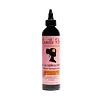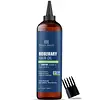What's inside
What's inside
 Key Ingredients
Key Ingredients

 Benefits
Benefits

 Concerns
Concerns

No concerns
 Ingredients Side-by-side
Ingredients Side-by-side

Emblica Officinalis Fruit Extract
Skin ConditioningSesamum Indicum Seed Oil
EmollientCocos Nucifera Oil
MaskingSimmondsia Chinensis Seed Oil
EmollientOlea Europaea Fruit Oil
MaskingMacadamia Ternifolia Seed Oil
EmollientButyrospermum Parkii Butter
Skin ConditioningTheobroma Cacao Seed Butter
EmollientHoney
HumectantBiotin
AntiseborrhoeicDimethyl Sulfone
SolventAhnfeltia Concinna Extract
Skin ConditioningSapindus Mukorossi Fruit Powder
Bacopa Monnieri Extract
Skin ConditioningEclipta Prostrata Extract
Skin ConditioningMelaleuca Alternifolia Leaf Oil
AntioxidantBehentrimonium Methosulfate
Emblica Officinalis Fruit Extract, Sesamum Indicum Seed Oil, Cocos Nucifera Oil, Simmondsia Chinensis Seed Oil, Olea Europaea Fruit Oil, Macadamia Ternifolia Seed Oil, Butyrospermum Parkii Butter, Theobroma Cacao Seed Butter, Honey, Biotin, Dimethyl Sulfone, Ahnfeltia Concinna Extract, Sapindus Mukorossi Fruit Powder, Bacopa Monnieri Extract, Eclipta Prostrata Extract, Melaleuca Alternifolia Leaf Oil, Behentrimonium Methosulfate
Alternatives
Ingredients Explained
These ingredients are found in both products.
Ingredients higher up in an ingredient list are typically present in a larger amount.
Biotin is a B vitamin that is naturally produced by our bodies. It is also called Vitamin H.
Our bodies use biotin in the metabolism process. It also helps our bodies use enzymes and move nutrients around. A biotin deficiency can lead to brittle hair and nails.
More research is needed on applying biotin topically. However, taking biotin orally has been shown to help nourish the skin, hair, and nails. They play a role in forming skin-hydrating fatty acids.
Biotin is water-soluble. It can be found in foods such as fish, eggs, dairy, nuts, and meat. Vitamin H stands for "haar" and "haut". These are the German words for hair and skin.
Learn more about BiotinSesame oil comes from sesame seeds. Sesame oil is rich in fatty acids and Vitamin E.
It has antibacterial, antioxidant, and anti-inflammatory properties. The phenolic compounds of this ingredient (including vitamin E) give it these properties.
Unrefined sesame oil has a comedogenic rating of 3, while refined sesame oil has a rating of 1. This ingredient may not be fungal-acne safe.
The fatty acids in sesame oil include linoleic acid (41%), oleic acid (39%), palmitic acid (8%), stearic acid (5%), and some small traces of others.
Learn more about Sesamum Indicum Seed OilThis oil comes from the seeds of the desert shrub called Jojoba. It is more commonly known as jojoba oil, a non-comedogenic oil.
Jojoba oil does not contain fragrance and has many fatty-acids, making it a great soothing ingredient.
It also contains Vitamin E, a great moisturizing ingredient. Vitamin E is also an antioxidant and protects your skin against oxidative damage.
This ingredient humectant properties, meaning it helps draw moisture from the air. This helps keep your skin hydrated.
While jojoba has antibacterial properties, it is only able to kill some strains of bacteria.
Studies also show it helps in wound healing. In fact, Indigenous cultures have used jojoba as a moisturizer and to help treat burns for centuries.
Fun fact: Jojoba oil similar to natural human skin sebum, so it has a great effect on dry skin. It is also promising with helping to regulate sebum production.
Due to its fatty acid content, Jojoba oil may not be fungal acne safe. We recommend speaking with a professional if you have any concerns.
Learn more about Simmondsia Chinensis Seed Oil